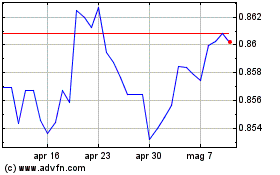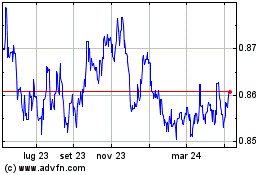Pound Falls Despite Upbeat U.K. Inflation Data
12 Dicembre 2017 - 7:12AM
RTTF2
The pound dropped against its major rivals in the European
session on Tuesday, even as UK inflation accelerated to a more than
five year high in November.
Data from the Office for National Statistics showed that
inflation rose unexpectedly to 3.1 percent in November from 3
percent in October. Inflation was last higher in March 2012. The
rate was expected to remain at 3 percent.
On a monthly basis, consumer prices rose 0.3 percent, slightly
faster than the expected 0.2 percent increase.
Inflation, based on the consumer prices index including owner
occupiers' housing costs, held steady at 2.8 percent in
November.
Likewise, core inflation that excludes volatile energy, food,
alcoholic beverages and tobacco, remained unchanged at 2.7
percent.
Another report from ONS showed that output price inflation
climbed to 3 percent in November from 2.8 percent in October.
Similarly, monthly increase moved up to 0.3 percent from 0.2
percent.
At the same time, input price inflation surged to 7.3 percent on
a yearly basis from 4.8 percent a month ago. Month-on-month, input
prices gained 1.8 percent following October's 1 percent rise
Meanwhile, European stocks rose as a two-day meeting of the U.S.
Federal Reserve gets underway later today, with investors expecting
the U.S. central bank to hike rates by 25 basis points and maintain
expectations of three hikes in 2018.
Other major central banks, including the European Central Bank,
Bank of England and the Swiss National Bank will announce their
policy decisions on Thursday.
The currency showed mixed trading in the Asian session. While it
held steady against the greenback and the euro, it rose against the
franc. Against the yen, the currency fell.
The pound dropped to an 8-day low of 1.3178 against the franc,
from a high of 1.3253 hit at 3:15 am ET. The next possible support
for the pound is seen around the 1.30 level.
The pound weakened to a 5-day low of 0.8846 against the euro,
after having advanced to 0.8806 soon after the release of the data.
The pound is seen finding support around the 0.90 region.
Survey data from the Mannheim-based think tank ZEW showed that
Germany's economic sentiment weakened in December.
The ZEW Indicator of Economic Sentiment fell 1.3 points to 17.4
in December. The indicator remained below its long-term average of
23.7 and the expected level of 17.6.
The pound slid to a 2-week low of 1.3311 against the greenback,
following an advance to 1.3380 in the immediate aftermath of the
data. Continuation of the pound's downtrend may see it challenging
support around the 1.31 area.
The U.K. currency declined to a 5-day low of 151.03 versus the
Japanese yen, from a high of 151.76 hit quickly upon the release of
the data. Further downtrend may take the pound to a support around
the 153.00 level.
Data from the Ministry of Economy, Trade and Industry showed
that Japan's tertiary activity index increased at a
faster-than-expected pace in October, after falling in the previous
two months.
The tertiary activity index climbed 0.3 percent month-over-month
in October, reversing a 0.2 percent decrease in September.
Economists had expected a 0.2 percent rise for the month.
Looking ahead, U.S. producer prices and monthly budget statement
for November are due in the New York session.
Grafico Cross Euro vs Sterling (FX:EURGBP)
Da Mar 2024 a Apr 2024

Grafico Cross Euro vs Sterling (FX:EURGBP)
Da Apr 2023 a Apr 2024
